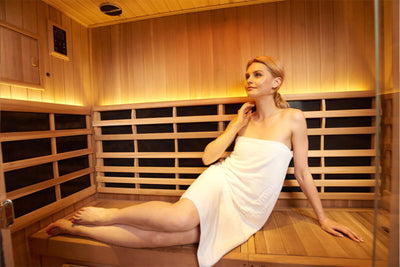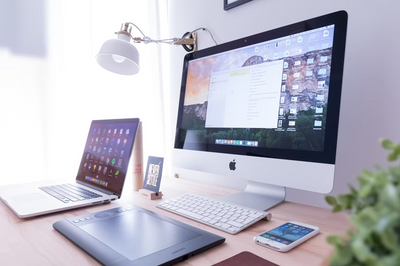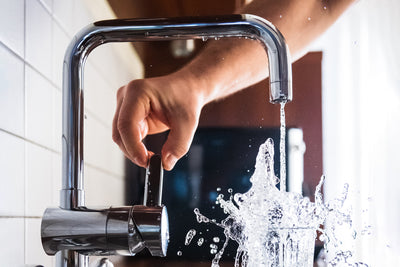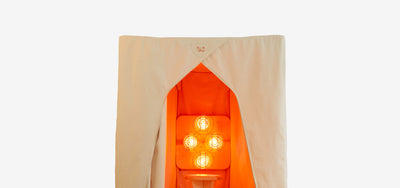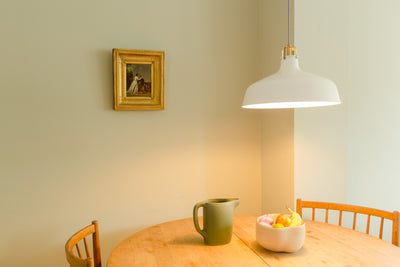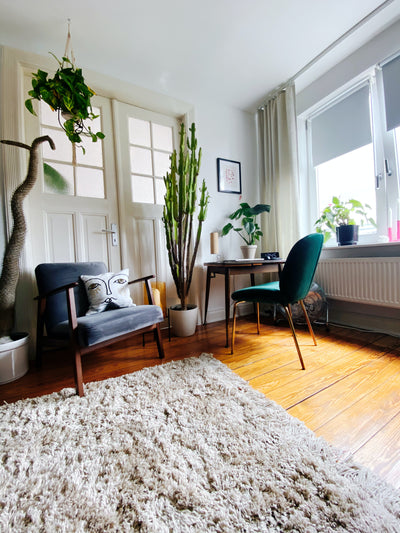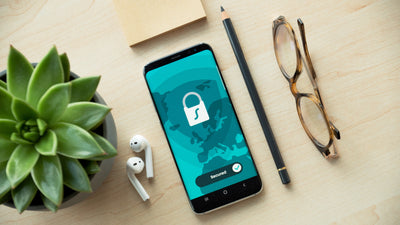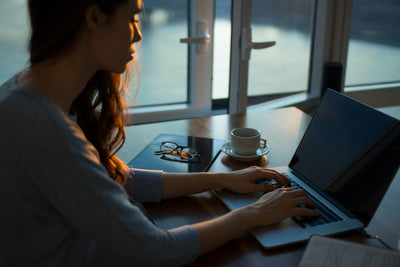Lights out: is the blue light from our digital devices doing us damage?

Light has always played a fundamental role in human life on Earth, with the reliable rise and fall of the sun dictating the start and close of the day. But beginning with the glow of the first electric lightbulbs, over the last century we have gradually been increasing the amount of artificial light we are exposed to. This steady escalation has brought about our current state of reality, where most of us are now getting less natural light than we need during the day, but much more artificial light than our bodies are used to at night. The main form of this unnecessary night-time luminosity? Blue light.
Before we delve deeper into the effects of blue light, let’s establish what it is, exactly.
The term ‘blue light’ (sometimes referred to as HEV, or high-energy visible light) covers the shorter wavelengths and higher frequencies of light that exist in the violet-blue coloured band of the visible spectrum. Blue light is present in daylight – and always has been, but it is also emanated by fluorescent lighting and LEDs, including light bulbs, smartphones, tablets, computers, e-readers and TV screens. And with the number of devices we own and the amount of hours we spend on them increasing (more than ten hours every single day, according to this report), (1) we’re receiving more blue light exposure, from more sources and later into the night, than ever before.
So, what might this dramatic increase in blue light mean for our bodies, and how can we start to regain a state of equilibrium with our ever-encroaching screens.
Blue Light and Skin
In recent years, rumours have been swirling about the havoc that the glare from our computers could be wreaking on our skin. Talk of premature aging, wrinkles and uneven pigmentation – all caused by blue light – abounds, with ‘Screen Face’ now a recognised term, and products increasingly appearing and promising to shield us against it.
So, is the blue light emitted by our digital devices really harming our skin? The answer seems to be: possibly. Some skincare experts are now labelling blue light equally as aging as sun damage, with beauty industry icon Dr Murad telling Harper’s Bazaar (2) that “spending four eight-hour workdays in front of a computer exposes you to the same amount of energy as 20 minutes in the mid-day sun.” A number of scientific studies (3) have supported this argument, demonstrating how blue light is capable of generating reactive oxygen species in the skin that can encourage signs of aging, as well as (4) increasing enzymes that cause wrinkles and damage collagen – making skin appear less plump and youthful.
The bulk of the research carried out to date, however, has centred on the impact of ultraviolet light on our skin – including harmful UVA and UVB rays, and it’s still this area that the majority of dermatologists are most concerned about. As Andrew Birnie, a dermatologist and skin-cancer specialist at the William Harvey and Kent and Canterbury Hospitals, puts it, (5) “if you’re sitting in front of a computer all day, and your monitor is next to a window, I think you should be more worried about the window than the computer.”
Blue Light and Eyesight
Aside from any aesthetic impact, concerns over the effect of blue light exposure on our eyes are growing. Frequent users of computers and mobile phones (which, let’s face it, probably covers most of us), increasingly complain of sore, tired eyes, headaches and even blurred vision. But are these symptoms being caused specifically by the blue light emitted by our digital devices, and if so, how?
In 2018, scientists from the University of Toledo seemed to get one step closer to an answer. They published a research paper (6) demonstrating how prolonged exposure to blue light triggers the creation of toxic molecules in the retina’s light-sensitive cells that can cause macular degeneration – an incurable condition that damages vision, often leading to – and speeding up - blindness. As scary as that might sound, subsequent hysteria-provoking headlines were tempered slightly by the paper’s senior author, Ajith Karunarathne, who told The Verge (7) that their study “absolutely” doesn’t show that staring at an iPhone or tablet will bring about blindness in the human eye itself, but rather demonstrates how exactly blue light can cause ocular cell damage. “We haven’t done any experiments with the light coming out of digital devices, or any other digital screens,” he said, “So, I have to limit our conclusions.”
Whilst a number of other lab experiments have shown (8) that high exposure to blue light can damage the retinas of rats, scientists have yet to decisively demonstrate the same effects on human eye as a direct result of the blue light emitted by our digital devices, echoing Karunarathne’s sentiment that further research is required. Interestingly, a 2016 study (9) called for additional investigation to determine the effects of prolonged blue light exposure on eye function, concluding that whilst “exposure to blue light […] for a short to medium period (days to weeks) should not significantly increase the risk of development of ocular pathologies”, the same could not necessarily be said for longer term periods of months or years.
It seems we’ll just have to keep our (tired) eyes peeled for further, more conclusive scientific study in this area, but proceed with caution until that research comes through.
Blue Light and Sleep
If the link between blue light and skin or eye damage is somewhat inconclusive, its destructive effect on sleep is increasingly indisputable.
When we ponder getting a good night’s sleep, we might think of how many hours we have, or the time at which we close our eyes. But one of the most important aspects is, it seems, (10) the light we’re exposed to whilst awake.
Humans have evolved to be incredibly sensitive to light and dark, with special photoreceptors (11) found in the eye’s retina connecting directly to the part of the brain that regulates the body’s internal timing mechanism. This mechanism is officially termed the 'circadian clock', (12) but is sometimes referred to more simply as the ‘body clock’, which, within humans, follows a 24-hour cycle. As evidenced in a recent article (13) by The New Yorker, this natural scheduling system is now being constantly “wrong-footed” by artificially extended exposure to light: specifically, blue light – as emitted by our smorgasbord of digital devices, and wrongly interpreted by our circadian clock as daylight. When we use our mobile phones, tablets, e-readers or laptops at bedtime, we’re essentially telling our brain that it’s not time to go to sleep yet. When this happens, rather than receiving the usual release of the sleep-inducing hormone melatonin (which is actively suppressed by light), we feel abnormally energised and awake. Whilst light of any kind can stifle melatonin release, blue light at night (14) does so more significantly.
In one study (15) published earlier this year in the journal PNAS, people were asked to read either a blue light-emanating e-reader or a conventional paper book 4 - 5 hours before bed, for five consecutive evenings. The results were telling. Those who had read an e-book found it harder to fall asleep than those who’d read a printed book, feeling more alert and taking longer to drift off. In fact, the e-readers’ melatonin release was delayed by an astonishing hour and a half, meaning their body clocks were actively time-shifted. On top of this, when they awoke the next morning, they felt notably less energised.
As John O’Hagan of Public Health England’s centre for radiation, chemical and environmental hazards recently explained to The Guardian, (16) “if you go back in time, as soon as the sun went down you went to bed, and got back up again when the sun came up. It isn’t natural to extend your day with artificial lighting.” Not that long ago, he says, “your television was a relatively small device in the corner of the room. Now you’ve got a TV completely filling the wall; you are immersed in it.”
O’Hagan has also spoken out (17) against the installation of new LED streetlights on Britain’s roads, saying they could disrupt our circadian systems, thereby having “a major impact on sleep quality and daytime alertness, which in turn impacts wellbeing and safety. It is a bit like having permanent jet lag.”
A disturbed body clock can do more than leave you feeling tired. On top of the obvious negative impact that a lack of sleep can have (18) on your appearance (hello dark circles, wrinkles and lacklustre skin. They didn’t coin the phrase ‘beauty sleep’ by accident…), studies (19) have shown that an out-of-kilter circadian rhythm, as caused by an excess of blue light, could also be linked to a whole host of mental and physical health conditions, such as “depression, diabetes, hypertension, obesity and cancer”. Just last year, a study (20) published in The Lancet Psychiatry found that out of 91,105 subjects, those with disrupted sleep patterns were more likely to experience depression or have bipolar disorder. Professor Daniel Smith, one of the paper’s authors, said the worst affected were those with “very poor sleep hygiene – people on their mobile phones at midnight checking Facebook or getting up to make a cup of tea in the middle of the night”.
TOP TIPS: How to Fight Blue Light Damage
It’s clear that we need to regain our balance when it comes to when, and for how long, we use our digital devices – so we’ve done the hard work for you and rounded up the best advice on how to limit screen time and tackle blue light:
1. Guard your sleep: Do as the sleep experts do: turn electronic devices off at least one hour before bed, minimum. Use dim, red-toned lights as bedside lights. Introduce infrared light and heat therapy to your routine with SaunaSpace incandescent red bulbs, giving you the full spectrum of healing and detoxing light waves – and helping to alleviate insomnia in the process (which can be easily aggravated by blue light).
2. Use your phone’s inbuilt blue light deactivation setting: Most smartphones and tablets have a special setting (usually called ‘Night Shift’ or ‘Night Mode’) that restricts blue light in favour of yellow light; automatically adjusting the screen display colours to the warmer end of the spectrum – which is kinder to your skin and eyes. You can set this mode so that it operates at specific times, such as from sunset to sunrise, for an easy – and free – way of minimising the unwanted effects of blue light exposure.
3. Fill your diet with antioxidant-rich foods for natural protection: Studies (21) have shown that eating an antioxidant-rich, (22) nutrient-packed (23) diet full of colourful fruit and vegetables (think tomatoes, peppers, squash, carrots, berries and LOTS of leafy greens (24) can help to boost your skin and eyes’ natural defense against oxidative and free radical damage, helping you to ward off the symptoms associated with extensive screen time – from eye fatigue to headaches.
4. Shield your eyes: Why just filter blue light when you can block it out completely? That’s the thinking behind products like blue light blocking glasses and screen shields, which shield your eyes from all sources of blue light and help support ocular health. These could be especially handy if your job requires you to work night shifts or unsociable hours. Shop blue light protection here.
5. Get some natural daylight: Enjoying some natural light on your skin (it doesn’t have to be sunny!) during the daytime – maybe on your lunchbreak, for example - has been proven to help your ability to sleep at night, working to balance the artificial sources of light we’re increasingly exposed to in the evenings.
6. Sunscreen is non-negotiable: Blue light or no blue light, according to expert dermatologists, (25) the most important thing anyone can do to keep their skin looking youthful is to wear a broad-spectrum, five-star UVA protection sunscreen every single day. Here at Conscious Spaces, our preference would always be a stable, mineral-based formula over a chemical sunscreen – and preferably one that is reef-safe too.
7. Give topical creams and antioxidants a go: New, ‘smart shield’ sun and face creams are now available, promising added protection against the damaging effects of blue light and designed to defend skin against excess free radicals found in our environment. Always aim to use clean skincare containing antioxidant-rich extracts and active ingredients.
References
(1) https://www.nielsen.com/us/en/insights/report/2016/the-total-audience-report-q1-2016/
(2) https://www.harpersbazaar.com/uk/beauty/skincare/a22113765/blue-light-skin-damage-advice/
(3) https://www.ncbi.nlm.nih.gov/pubmed/28315451
(4) https://www.ncbi.nlm.nih.gov/pubmed/22318388
(5) https://www.theguardian.com/fashion/2017/jun/01/lights-off-is-the-glare-from-your-computer-really-ageing-your-skin
(6) https://www.nature.com/articles/s41598-018-28254-8
(7) https://www.theverge.com/2018/8/17/17724658/screen-time-blue-light-blindness-science
(8) https://www.nature.com/articles/eye1999142
(9) https://www.ncbi.nlm.nih.gov/pmc/articles/PMC4734149/
(10) https://www.ncbi.nlm.nih.gov/pubmed/19777353
(11) https://www.ncbi.nlm.nih.gov/pubmed/19777353
(12) https://en.wikipedia.org/wiki/Circadian_clock
(13) https://www.newyorker.com/science/maria-konnikova/why-cant-we-fall-asleep
(14) https://www.health.harvard.edu/staying-healthy/blue-light-has-a-dark-side
(15) https://www.pnas.org/content/pnas/112/4/1232.full.pdf
(16) https://www.theguardian.com/lifeandstyle/2018/may/28/blue-light-led-screens-cancer-insomnia-health-issues
(17) https://www.independent.co.uk/news/uk/home-news/ed-streetlight-bright-sleep-damage-eyesight-public-health-england-a8285981.html
(18) https://www.mindbodygreen.com/articles/can-blue-light-from-phones-and-computers-damage-skin-and-promote-aging
(19) https://www.ncbi.nlm.nih.gov/pmc/articles/PMC5473809/
(20) https://www.thelancet.com/journals/lanpsy/article/PIIS2215-0366(18)30139-1/fulltext
(21) https://www.ncbi.nlm.nih.gov/pmc/articles/PMC4706936/
(22) https://www.mdpi.com/2304-8158/6/7/47
(23) https://www.ncbi.nlm.nih.gov/pmc/articles/PMC4706936/
(24) https://www.aoa.org/news/clinical-eye-care/blue-light-nemesis-green-veggies-carotenoids
(25) https://www.theguardian.com/fashion/2017/jun/01/lights-off-is-the-glare-from-your-computer-really-ageing-your-skin


















